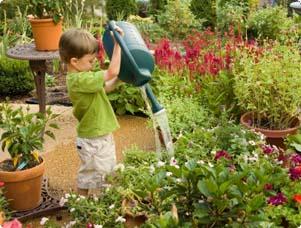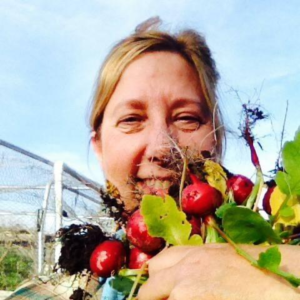By allowing Mother Nature to do her job, your garden will be healthier and be much easier to maintain.

By Sharon McCray

Sharon McCray
With your summer gardens all planted, whether vegetable or ornamental, or a mixed blessing of both, now is time to sit back and let Mother Nature take over. She has grand plans for your garden but needs your help if she is to succeed.
An important clue to keeping a healthy garden is to become a good observer. Get outside and see what is happening before it becomes a disaster. A few holes here and there in your lettuce, can quickly become a complete crop failure. Same with fruit on tomatoes and peppers.
To help to more easily identify garden problems it is good to know that “sucking” pests like snails and slugs, prefer the soft tissue of leaves, the area between the veins. Chewing insects, like caterpillars and earwigs, will typically start eating leaves on the outside edge, working their way to the soft tissue. A minor but important clue as to how to manage each specific problem. The favorite method for controlling snails will do nothing to manage earwigs.
 A small amount of yeast in a shallow pan filled with water will attract snails and slugs and they will drown. Similarly, a small empty tuna size can, when filled with soy sauce and a dash of oil, will attract earwigs and they will drown. Diatomaceous earth is another tried and true method to control crawling pests like sow bugs (AKA “rolly pollies”) and ants. Food grade diatomaceous earth is readily available at most garden or hardware stores, is reasonably priced and will be highly effective, not harming birds or mammals that might come into contact with it.
A small amount of yeast in a shallow pan filled with water will attract snails and slugs and they will drown. Similarly, a small empty tuna size can, when filled with soy sauce and a dash of oil, will attract earwigs and they will drown. Diatomaceous earth is another tried and true method to control crawling pests like sow bugs (AKA “rolly pollies”) and ants. Food grade diatomaceous earth is readily available at most garden or hardware stores, is reasonably priced and will be highly effective, not harming birds or mammals that might come into contact with it.
It is also reported to help with certain viruses that might be in the soil but the research is ongoing and not yet confirmed. Lightly spread the white powder on the soil, cement or mulch and wait. It is not affected by water.
IPM is no doubt a phrase you have heard before. It stands for integrated pest management, a method of allowing one beneficial garden visitor to take care of a garden pest. The IPM method of garden management is extremely useful if you hope to have a healthy and pesticide free garden.
Lady bugs are a great example. Few people realize that the ugly evil looking orange and black insect, with eight legs, looks nothing like its final life stage.
The ugly part of the pupation process creates this strange looking insect that will devour many more aphids than the mature beetle. It is difficult to describe this stage of development without photos so I encourage you to do a little research to see exactly what they look like. We love those cute little beetles and there is even a poem about them.
 By allowing Mother Nature to do her job, your garden will be healthier and be much easier to maintain. Avoid the “cides.” whether they be pesticides, herbicides and fungicides. They all contain toxins to many beneficial insects, especially bees. Whenever possible, grow plants that attract beneficial insects. Unfortunately, like every dedicated gardener, we always want the caterpillars in our neighbors garden and the butterflies in ours. Please do not use BT to control caterpillars as this mighty chemical also kills butterfly larva including Monarchs.
By allowing Mother Nature to do her job, your garden will be healthier and be much easier to maintain. Avoid the “cides.” whether they be pesticides, herbicides and fungicides. They all contain toxins to many beneficial insects, especially bees. Whenever possible, grow plants that attract beneficial insects. Unfortunately, like every dedicated gardener, we always want the caterpillars in our neighbors garden and the butterflies in ours. Please do not use BT to control caterpillars as this mighty chemical also kills butterfly larva including Monarchs.
Life is a balance and learning to gauge what is acceptable and what is absolutely crossing the line is up to you. Be ready to accept the consequences of your informed decisions.
Next month, we start to harvest. Yay!
Sharon McCray is a California native living in Santa Clara County since 1959. She became certified as a University of California cooperative extension master gardener in 1992 and a UCCE master naturalist in 2015. She hosts a monthly radio show on KKUP public radio and is now retired.






